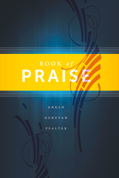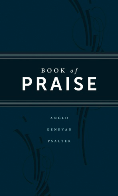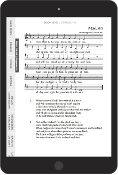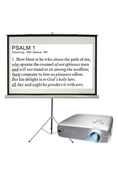About the Book of Praise
The Book of Praise: Anglo-Genevan Psalter is a publication of the Canadian Reformed Churches, a federation of more than sixty churches, most of which are in Canada and a few in the United States. Our churches are rooted in the Great Reformation of the sixteenth century. Our aim is to exalt the Triune God by faithfully proclaiming the gospel of Jesus Christ.
Our Book of Praise has an important function within our worship services. The word "praise" in the title reminds us of the exhortation in the letter to the Hebrews: "… let us continually offer up a sacrifice of praise to God, that is, the fruit of lips that acknowledge his name" (13:15). Because of his grace and faithfulness, the Lord meets with the people of his covenant in the worship service. In response to his Word we offer up our sacrifices of praise in psalms and hymns. The creeds and confessions are also the fruit of lips that acknowledge God’s name.
Our Book of Praise can be divided into four main parts, each of which serves as a reminder of our Reformed heritage: the Psalms and hymns, our doctrinal standards, the liturgical forms and prayers, and the Church Order and subscription forms.
Reformed churches have always attached great value to the Psalter as a collection of songs of God’s covenant. John Calvin wrote the following about congregational singing in his preface to the Geneva Psalter, 1543:
As for public prayers, there are two kinds: the one consists simply of speech, the other of song…. And indeed, we know from experience that singing has great strength and power to move and to set on fire the hearts of men in order that they may call upon God and praise him with a more vehement and more ardent zeal. It is to be remembered always that this singing should not be light or frivolous, but that it ought to have weight and majesty, ... Now, what Augustine says is true, namely that no one can sing anything worthy of God which he has not received from him. Therefore, even after we have carefully searched everywhere, we shall not find better or more appropriate songs to this end than the Psalms of David, inspired by the Holy Spirit. And for this reason, when we sing them, we are assured that God puts the words in our mouth, as if he himself were singing through us to exalt his glory.
The first complete Genevan Psalter was published in 1562. Four years later the Genevan tunes were used by Petrus Dathenus in his Dutch versification of the Psalms. The Genevan Psalter has been associated with the churches of the Reformation ever since. When members of the Reformed Churches in the Netherlands (Liberated) came to North America after the Second World War and established the Canadian Reformed Churches, they brought with them their appreciation for the Genevan Psalter. As early as 1954, the first General Synod of our churches appointed a committee to study the possibility of producing such a Psalter in the English language. In 1972 the first complete Book of Praise: Anglo-Genevan Psalter appeared, and English metrical versions of all the Psalms could be sung for the first time to the authentic Genevan melodies of the sixteenth century. The present text is the result of a thorough revision of this Psalter as it was initiated by General Synod 2007 and completed by General Synod 2013.
Although in Reformed liturgy the Psalms have a predominant place, our churches have not excluded the use of scriptural hymns. They, too, constitute a thank offering of praise when we sing of the facts of redemption by God in Jesus Christ our Lord.
The doctrinal standards of our churches are included next. The ecclesiastical documents of the Dutch Reformed Churches were first translated into English by churches composed of English and Scottish refugees in the Netherlands. These translations were used in only slightly revised form by the Reformed Church in America and, later, also by the Christian Reformed Church. Whereas the Canadian Reformed Churches first made grateful use of these older translations, here the creeds and confessions are presented in contemporary English.
The liturgical forms and prayers make up the third main division. The forms for the administration of infant baptism and of the Lord’s supper as well as the form for the solemnization of marriage first appeared in the Dutch Psalter of Petrus Dathenus (1566). The forms for the administration of church discipline, the ordination of ministers, and the ordination of elders and deacons were added by the Synod of The Hague in 1586, and the form for the administration of adult baptism by the Synod of Dort in 1618-19. Whereas the Canadian Reformed Churches first used the version published in 1767 by the Reformed Protestant Dutch Church of New York, the liturgical forms are published here in current English along with forms adopted more recently. The collection of prayers which follows the forms also dates from Reformation times; it, too, had its place in the Psalter of Dathenus. The English text of these prayers has been modernized. Although their use is not obligatory, they can be of great value in public and private worship.
The Church Order could be considered an appendix to the Book of Praise. This document dates back to the first synod of the Reformed Churches of the Netherlands, held in Emden in 1571, and was subsequently revised by the Synod of Dort, 1618-19. It appears here in the revised form adopted by General Synod Cloverdale, 1983, and amended by subsequent synods. As well, two subscription forms, adopted by General Synod Smithers, 2007, are included. At the very early synods, the brothers put their signatures under the confessions to signify their agreement with them. The Form of Subscription was adopted by the Synod of Dort. The forms as they appear here are translations and adaptations of the original Dort Form of Subscription.
We are thankful that the Book of Praise continues to be a blessing to the church of Christ. Above all, may our God be "enthroned on the praises of Israel" (Psalm 22:3) also through the use of this book. To him alone be all glory, now and forever.



